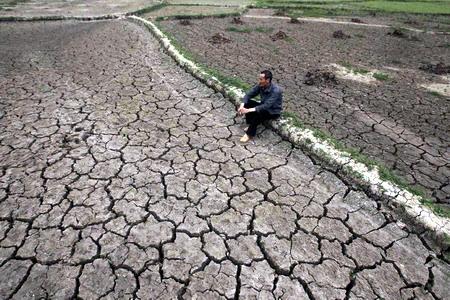
A farmer sits beside his land severely hit by drought in Yunnan province. Yunnan is the largest supplier of notoginseng root (sanqi), a natural herb believed to be useful in adjusting the body's internal balance and improving health.[China Daily]
SHANGHAI: As the brutal drought tightens its grip on southwestern China, shares of some food and medicine companies have begun to rise due to plummeting output and an expected price increase for rice, sugarcane and herbal medicine in these regions.The provinces of Yunnan, Guizhou and Sichuan, and Guangxi Zhuang autonomous region are among the most severely hit regions in this once-in-a-century drought. Some 16.09 million people lack drinking water and analyst estimates put direct losses from the drought at 19.02 billion yuan ($2.79 billion).
The southwestern area produces 20 percent of the nation's total sugar. According to the latest weather forecast the lack of precipitation won't improve until the middle of April, meaning sugarcane output will drop greatly, said Chen Guangyao, an industry analyst with Founder Securities.
On Tuesday, most listed sugar producers saw price increases on market expectations that the sugar prices will go higher.
Although the Shanghai Composite Index fell 0.70 percent to close at 3,053.13 on Tuesday, Nanning Sugar Industry Co Ltd surged 0.29 percent to 20.81 yuan apiece, and Guangxi Guitang (Group) Co Ltd rose 1.54 percent to 10.58 yuan.
Another sector benefiting from the drought is rice producers, which had an across-the-board rally on the bourse. Among them, JinJian Cereals Industry Co Ltd hit the daily up-limit of 10 percent to close at 9 yuan, Gansu Dunhuang Seed Industry Co Ltd ended at 17.39 yuan, up 2.6 percent, while Xinjiang Talimu Agriculture Development Co Ltd rose 3.62 per cent to close at 19.16 yuan apiece.
"Although southwestern regions are not traditionally major rice producers, rice is a staple food for most of the population there. It's foreseeable that a lot of rice will be sent to the drought-hit areas from other provinces, which has pushed up prices in the short term," said Chen.
The brutal dryness also wreaked havoc on some precious natural herbs, which are key ingredients in traditional Chinese medicine.
Yunnan is the largest supplier of notoginseng root (sanqi), a natural herb believed to be useful in adjusting the body's internal balance and improving health.
"Yunnan produces nearly 97 percent of the nation's total sanqi, but the lack of rain since last July will deal a heavy blow to herb production in the following two years, because it takes three years for this herb to mature," said Qu Yi, an industry analyst with Donghai Securities.
According to Qu, sanqi prices soared more than six fold to 350 yuan per kilogram in March from 50 yuan in 2008. "It's obvious the result of the bad weather, and we expect production to drop 30 percent or more this year," Qu said.
Many Chinese pharmaceutical enterprises have fallen victim to the sanqi price rise. Most of the medicine produced by Yunnan Baiyao Group Co Ltd and Kunming Pharmaceutical Group Co Ltd contains sanqi.
A pharmaceutical analyst, who asked not to be named, said soaring prices of herbs like sanqi may result in two different situations.
"The medicine producers will cut the output of traditional Chinese medicine containing the ingredient, or they will push the pricing pressure downstream to consumers. In both cases, the biggest loser is consumers," he said.
Shares of Yunnan Baiyao rose 0.18 yuan, or 0.33 percent, to close at 55.53 yuan apiece on Tuesday, while Kunming Pharmaceutical gained 0.40 yuan, or 3.34 percent, to end at 12.36 yuan per share.





